Debt can feel like dark storm cloud looming over you. However, you do have rights on how and when you can be contacted.
If you can contact the creditor before the debt is sold to a debt collection company, you may be able to work out a payment plan with the creditor. It is up to the creditor if they want to modify the agreement, but it could save you from dealing with a debt collection agency. We have found that creditors are more willing to be helpful, cooperative, and amicable when you openly communicate and maintain contact with the appropriate person regarding the debt.
A debt collector can only collect the original amount agreed upon unless a written contract authorizes additional fees such as attorney fees, investigation, service, or collection fees. If a debt collector contacts you and you feel they have an item incorrectly calculated, you must give the debt collector a written notice. It is best to send the original copy to the debt collector and keep a copy for yourself while sending the notice certified mail with return receipt requested.
A debt collection agency may not, under Texas law:
• Threaten you with violence or other criminal acts
• Use profane or obscene language
• Threaten to have the consumer arrested or have property or other assets repossessed without proper court proceedings
• Harass a consumer by making anonymous or continuous calls
Under federal law a collection agency may not:
• Communicate with the consumer at “any unusual time or place known or which should be known to be inconvenient to the consumer”
• Tell a third-party that the consumer owes any debt
• Harass, oppress, or abuse any person in collection of a debt.
• Use any false, deceptive, or misleading representation in means of collecting any debt
• Use unfair or unconscionable means to collector or attempt to collect any debt.
Under federal law a “convenient” time is described as between 8 a.m. and 9 p.m. local time for the consumer. A debt collector cannot communicate with someone other than the debtor about the debtor’s location unless they debt collector identifies themselves. The debt collector also cannot communicate with someone other than the debtor about the debtor’s location more than once unless the debt collector reasonably believes the prior information was incorrect.
In Texas, if your residence has been declared a homestead, then your home cannot be taken to pay debts except under certain circumstances, a few of which are: 1) an ad valorem tax lien; 2) a mechanics/materialman’s lien for unpaid charges for home improvement or construction costs; 3) a home equity lien; or 4) a purchase money lien. For more information on homesteads, click here.
Your wages may be taken to help pay for court-ordered child support, back taxes, or defaulted student loan debt.
If you believe a debt collector has violated the Texas Debt Collections Act, you can file a complaint with the Texas Attorney General, click Here. You will need the name of the business, or full name of the individual, against whom you are filing the complaint, their full address with zip code, and a description of your complaint. It is helpful to have details on the contact you have had with them such as transaction dates and details, contract information, payment details, and any information on efforts you have made to resolve the dispute. If possible, try to keep track of the name and date of whom you have spoken to at the business.
In Texas, the statute of limitations for debt is four years. Generally speaking – this means that if your debt is four-years past due, you can no longer be sued for that debt. However, that does not mean you do not have to pay the debt. Instead, the debt becomes a “moral obligation,” but there is no remedy for enforcement. However, if a court judgment against the debt there could be a separate statute of limitations that applies to the judgement. Also, if you decide to pay on an old debt, even a small amount could restart the statute of limitations.
– The Business Team
Scott | Josh | Jeremy
The Allen Firm, PC
181 S. Graham Street | Stephenville, Texas 76401
Ph: 254.965.3185 | Fax: 254.965.6539

